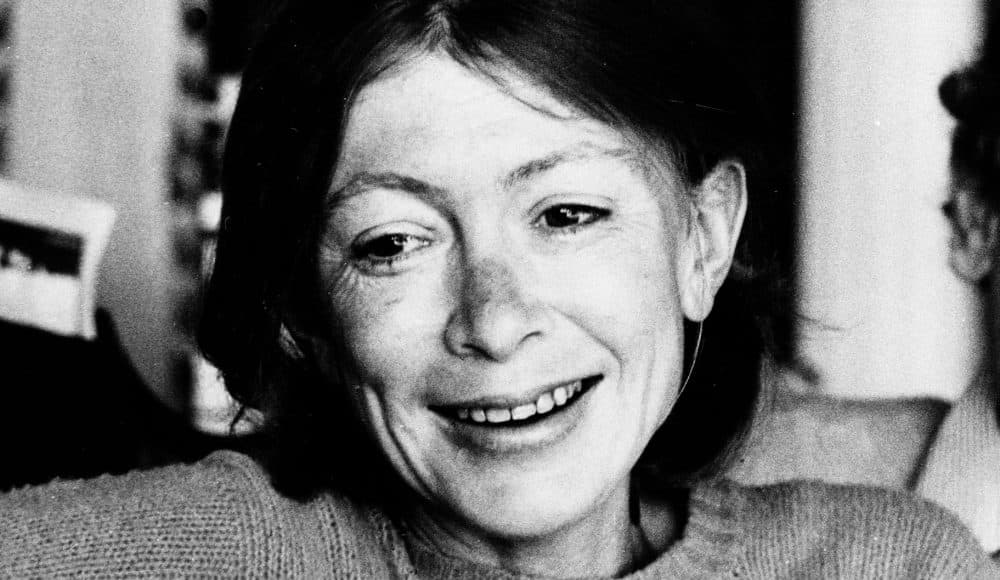Advertisement
Commentary
Who Is The Joan Didion Of Our Times?

I went to San Francisco because I had not been able to work in some months, had been paralyzed by the conviction … that the world as I had understood it no longer existed.
That’s Joan Didion, in the introduction to her essay collection “Slouching Towards Bethlehem,” describing her mood in 1967 as she set out to report on the Summer of Love in San Francisco.
The title essay, which famously ends with Didion interviewing a 5-year-old girl tripping on acid, is taught as a classic because it conveys not just reportage on what was happening on the ground in Haight-Ashbury, but the author’s state of mind, and the mood of a country beset by race riots and antiwar protests.
The world as I had understood it no longer existed.
Hm. Anyone else feeling those feels right about now?
I’ve been a Didion fan for decades, but I restarted a serious love affair recently after watching “The Center Will Not Hold,” the recent Netflix documentary directed by her nephew, Griffin Dunne.
As we search for analogies to our current-day reality of social, racial and political commotion — all salted over with a steady stream of predawn presidential tweets — it’s hard not to hang on every word of Didion’s, who chronicled so well the last time our country was so sharply divided.
In her 1969 essay “The White Album,” Didion writes that following an attack of vertigo and nausea, a psychiatric evaluation determined she was “alienated,” “fatalistic” and “unable to mediate the world of reality.”
“By way of comment,” Didion writes, “I offer only that an attack of vertigo and nausea does not now seem to me an inappropriate response to the summer of 1968.”
Who is writing like that now?
We have no shortage of hot takes on events of the day. What I long for is a 10,000-foot view, someone with Didion’s detached, rational perspective, able to make connections and put seemingly random developments into the larger context of where we’re heading as a nation.
Advertisement
Twitter’s 280-character limit and nanosecond response times make it particularly ill-suited to introspection, though some folks are making great use of the platform's threading capability. My favorites include broadcast journalists Joy Reid and Ana Navarro; black activists Deray McKesson and Johnetta Elzie; voter advocate Celeste Pewter; and Trump/Mueller-watchers Caroline O., Sarah Kendzior, Jared Yates Sexton and Seth Abramson.
Over on Facebook, former broadcast news anchor Dan Rather has gained a new audience as the voice of patriotic reason, while former Labor Secretary Robert Reich has carved out a niche with his video series explaining the basics of democracy, capitalism and inequality (sample show: “Impeachment Explained”).
If Facebook is (understandably) no longer your thing, or the idea of old white men being the voice of our times doesn’t jibe, how about a podcast — the medium of the moment — by two young African-Americans? “Still Processing,” hosted by New York Times writers Jenna Wortham and Wesley Morris, can hit a sweet spot that’s pretty close to Didion’s vibe.
The duo’s field trip to Washington to view the new portraits of the Obamas, or the episode that connected Clint Eastwood’s new movie with the Olympics in South Korea and the massacre of students in Parkland, Fla., are simultaneously cultural, political and personal in a way that feels deeply relevant.
Ta-Nehisi Coates, a frequent guest on the podcast, could be in the running for Didion’s crown — for his writing, mostly about race, for The Atlantic; for “Between the World and Me,” a letter to his son about being black in America, which won the National Book Award; and for his work writing the Black Panther comic (the other medium of the moment).
What Coates is to race relations, Rebecca Solnit is to feminism. A columnist for The Guardian and Harper’s, and the author of 17 books, Solnit is known popularly for her essay “Men Explain Things to Me,” the impetus for the “mansplaining” movement, but her reach is much wider — art, environmentalism, urbanism, inequalities and their antidotes.
These writers are wonderful, and they all succeed in making me feel less crazy about the times, but none of them is Joan Didion.
In her 2017 essay “Protest and Persist: Why Giving Up Hope Is Not an Option,” Solnit makes the case that the true impact of activism can take generations to take hold, connecting anti-pipeline activists in Standing Rock with Occupy Wall Street, Act Up, and (improbably) New England’s very own Clamshell Alliance, which protested construction of the Seabrook, N.H., nuclear power plant.
I’m not the only admirer of Solnit — the New York Times’ T Magazine last August ran a profile under the headline, “How Rebecca Solnit Became the Voice of the Resistance.”
Still, for all Solnit’s deep perspective and steady wisdom, I miss in her writing Didion’s sardonic humor. (In an essay for Life magazine about travelling to Hawaii with her husband, writer and screenwriter John Gregory Dunne, Didion famously wrote, “We are here on this island in the middle of the Pacific in lieu of filing for divorce,” a line she later said her husband not only approved of, but helped her edit.)
Roxane Gay is feminist and funny, as is Lindy West, of the New York Times. My kids — a millennial and a Gen Z-er — recommended Lauren Duca, the writer who put Teen Vogue on the resistance map with “Donald Trump is Gaslighting America.” And I’m proud to say I discovered comedian-slash-mental-health-advocate Sara Benincasa all on my own.
These writers are wonderful, and they all succeed in making me feel less crazy about the times, but none of them is Joan Didion. Yet, anyway.
Who are you reading/following/listening to/re-posting right now who’s giving you that clarity? Who’ll be on our bookshelves or playing on our cellphone speakers — or implanted in that little chip in our brains — 50 years from now?

